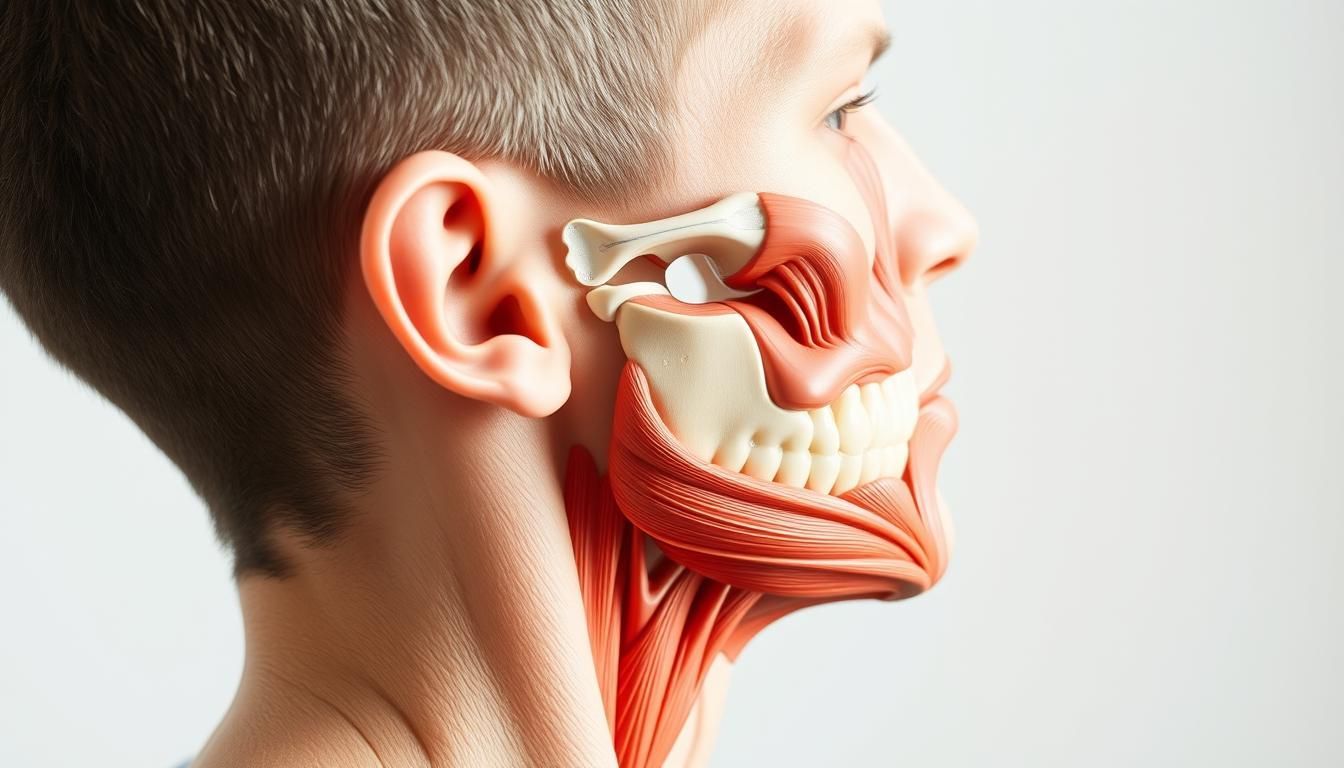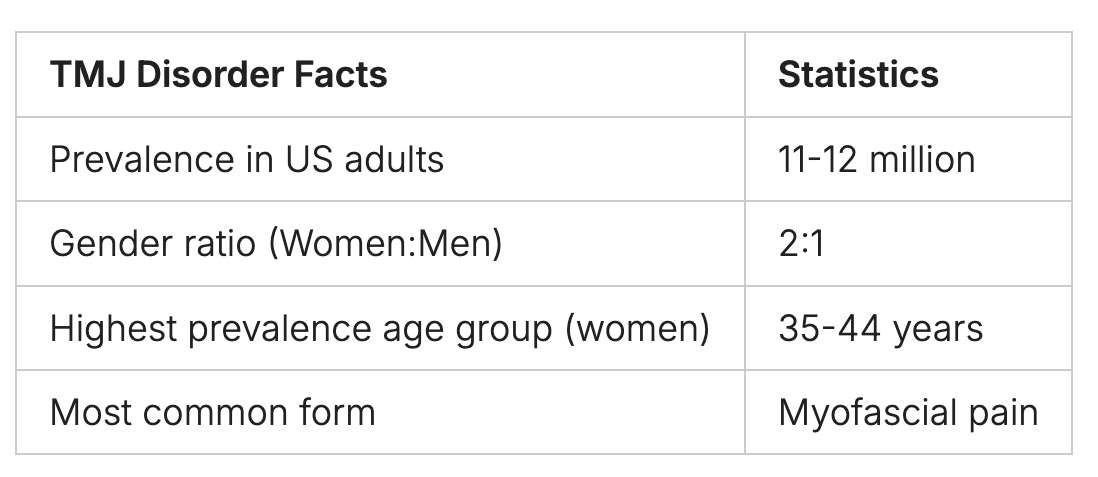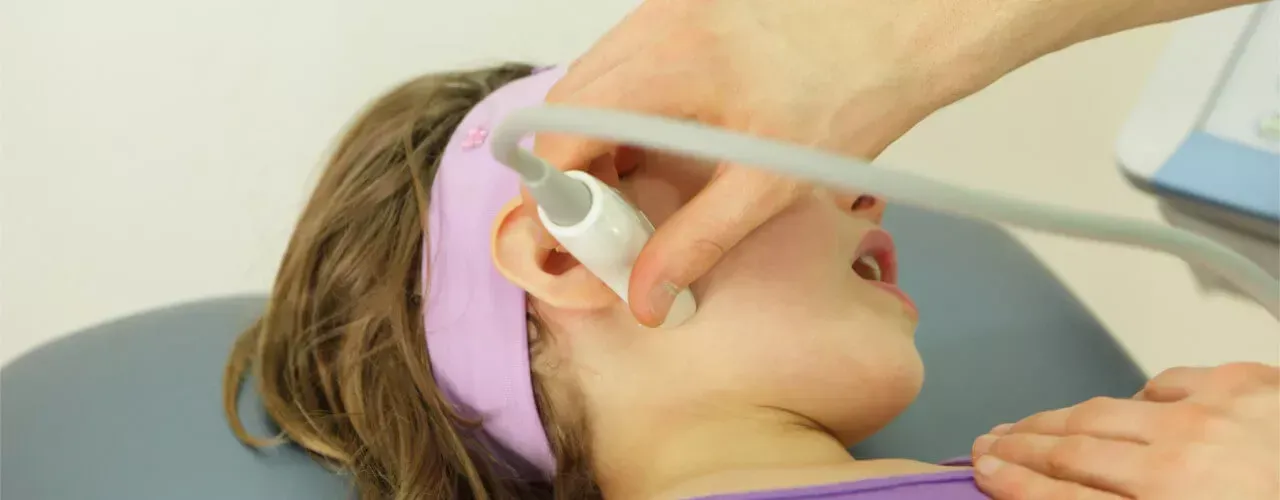New Paragraph
10 Things That Make TMJ Worse
10 Things That Make TMJ Worse

TMJ disorders affect the jaw joints, muscles, and tissues. About 35 million people in the U.S. suffer from it. It's vital to know what triggers TMJ symptoms. Stress, teeth grinding, poor posture, and diet can all increase jaw pain.
Interestingly, most TMJ sufferers are female or assigned female at birth. This shows the need for research and treatment that targets this group. We'll look at ten factors that make TMJ symptoms worse. We'll also discuss ways to manage and ease this condition.
Key Takeaways
- TMJ affects 35 million Americans, with over 90% being female
- Stress, teeth grinding, and poor posture can worsen TMJ symptoms
- Conservative, reversible treatments are recommended for TMJ management
- Self-care options include using heat and cold therapy
- Proper dental care is key in managing TMJ disorders
- Chronic stress and anxiety can lead to habits that worsen TMJ
- Understanding TMJ triggers is essential for effective symptom management
What Is TMJ? Temporomandibular Joint (TMJ) Disorders
The temporomandibular joint (TMJ) connects your jawbone to your skull. It's key for daily activities like talking, chewing, and yawning. TMJ disorders can cause jaw pain and discomfort in the muscles around it.
TMJ disorders affect millions of Americans, with women more likely to experience symptoms than men. It's most common in people aged 20 to 40. Symptoms can vary from mild to severe, lasting days to years.
- Jaw injuries or trauma
- Teeth grinding (bruxism)
- Stress and anxiety
- Misalignment of teeth or jaw
- Arthritis in the joint
Diagnosing TMJ disorders can be tough because symptoms are similar to other conditions. Dentists and doctors use physical exams, imaging tests, and sometimes TMJ arthroscopy for diagnosis.
TMJ relief often starts with simple treatments like pain relievers, ice packs, and lifestyle changes. For severe cases, treatments may include physical therapy, oral splints, or surgery. Many find relief through a mix of self-care and professional help.
Symptoms and Causes
TMJ disorders affect millions in the US, causing jaw pain. Knowing the symptoms and causes is key to managing and treating them.
Recognizing TMJ Symptoms
TMJ symptoms vary from mild to severe. Common signs include:
- Jaw pain or tenderness
- Difficulty chewing or opening the mouth
- Clicking or popping sounds when moving the jaw
- Facial pain spreading to the neck and shoulders
- Headaches and earaches
These TMJ symptoms can make daily tasks hard, like eating or speaking.
Main Causes of TMJ Dysfunction
TMJ disorders come from different sources:
- Teeth grinding (bruxism)
- Jaw misalignment
- Arthritis in the joint
- Stress and anxiety
- Injury to the jaw or surrounding muscles
Factors That Worsen TMJ
Some habits and conditions can make TMJ worse:
- Poor posture
- Excessive gum chewing
- Clenching jaw during stress
- Eating hard or chewy foods
Potential Complications
Untreated TMJ disorders can lead to:
- Chronic pain
- Sleep disturbances
- Difficulty eating
- Depression and anxiety
Many want to cure TMJ permanently. But, treatment often focuses on managing symptoms and finding the root cause. TMJ infections, though rare, need quick medical help due to symptoms like fever and swelling.

The 10 Things That Make TMJ Worse
TMJ disorders affect millions in the U.S., causing jaw pain. Knowing what makes symptoms worse is key to managing them. Let's look at the top factors that can make TMJ problems worse and how to avoid them.
- Stress, Anxiety, and Emotional Well-Being
Chronic stress often leads to clenching or grinding the teeth, which places extra strain on the jaw joint and surrounding muscles. - Teeth Grinding (Bruxism) and Clenching
Constant grinding or clenching of teeth—especially at night—exerts excessive pressure on the TMJ, exacerbating pain and inflammation. - Poor Posture and Slouching
Slouching strains the neck and shoulder muscles, which, in turn, can misalign the jaw and intensify TMJ discomfort. - Overuse of Jaw Muscles (Excessive Chewing or Talking)
Overworking the jaw—by habitually chewing gum, snacking all day, or even forceful yawning—can fatigue the muscles and worsen TMJ pain. - Hard or Chewy Foods
Bagels, chewy candies, or tough meats require significant jaw force, aggravating already sensitive joints and muscles. - Non-Functional Jaw Activities (Nail Biting, Lip Chewing, etc.)
Nervous habits like biting fingernails or chewing on pens continually engage and stress the jaw, leading to further irritation. - Smoking
Chemicals in tobacco can reduce blood flow and promote inflammation, complicating TMJ healing and aggravating jaw pain. - Resting on Your Chin
Supporting your face with your hand adds constant, uneven pressure to the TMJ, potentially misaligning the joint. - Self-Medicating Without Guidance
Relying solely on over-the-counter painkillers or unverified home remedies—without professional evaluation—can mask symptoms and delay proper treatment. - Ignoring Oral Care and Delaying Treatment
Skipping routine dental checkups or postponing professional interventions allows minor TMJ issues to worsen over time.

Other factors that worsen TMJ include using teeth as tools, chewing gum frequently, and uneven chewing. Regular dental check-ups and lifestyle modifications are key to managing TMJ disorders. Remember, while there's no single best medicine for TMJ flare up, a combination of proper care, exercises, and stress management can significantly improve your quality of life.
Prevention & Outlook
PRevention Matters
TMJ disorders affect millions of Americans, disproportionately impacting women. Taking steps to prevent or minimize TMJ symptoms is crucial for maintaining a good quality of life. Many factors—such as stress, jaw overuse, and poor posture—can exacerbate TMJ issues. By addressing these early, you can often avoid more severe complications.
Prevention Strategies
- Lifestyle Modifications
- Stress Management: Chronic stress can lead to clenching and grinding, so incorporating relaxation techniques (like meditation or deep breathing) helps.
- Proper Posture: Keeping your head aligned over your spine relieves strain on the jaw, neck, and shoulder muscles.
- Avoid Hard or Chewy Foods: Steer clear of tough meats, gum, or chewy candies that can overwork your jaw.
- Jaw Exercises: Gentle stretches and strengthening exercises recommended by a dentist or physical therapist can keep your TMJ mobile and stable.
- Routine Dental Care
- Regular Checkups: Dentists often spot early signs of TMJ dysfunction and can recommend bite adjustments or mouth guards.
- Night Guards: If you grind or clench your teeth, wearing a custom mouth guard prevents additional stress on your TMJ.
- Early Intervention
- Recognizing Symptoms: If you notice persistent jaw pain, clicking, or limited mouth opening, consult a healthcare professional.
- Avoiding Harmful Habits: Don’t bite nails, rest your chin on your hand, or use your teeth as tools—these habits exacerbate jaw stress.
How Long Does TMJ Dysfunction Last?
The duration of TMJ dysfunction varies widely:
- Some individuals experience short-lived flare-ups lasting weeks or months and find relief through conservative treatments like jaw exercises, heat/ice therapy, and stress management.
- Others may face longer-term or chronic TMJ issues that persist for years, especially when underlying factors (e.g., severe misalignment, high stress, or bruxism) go unaddressed.
- The good news is that up to 40% of TMJ cases improve naturally over time. Additionally, early diagnosis and targeted therapy can lead to better long-term outcomes.
Can TMJ Disorder Be Cured?
While a complete cure isn’t always guaranteed, effective management can significantly improve daily life. Studies suggest:
- 50% to 90% of individuals see marked improvement or remission of symptoms with the right combination of lifestyle changes, physical therapy, and professional care.
- Newer treatments (like regenerative therapies or specialized injections) offer additional hope for those with persistent, severe TMJ issues.
TMJ Treatment Options
When TMJ symptoms interfere with your daily activities, there are several treatment avenues to explore:
- Self-Care Techniques
- Heat Therapy: Applying warm compresses can relax tight jaw muscles.
- Cold Therapy: Using ice packs reduces inflammation and pain.
- Jaw Exercises: Specific movements improve range of motion and muscle balance.
- Conservative Medical Treatments
- Nonsteroidal Anti-Inflammatory Drugs (NSAIDs): Alleviate pain and reduce inflammation.
- Muscle Relaxers: Help ease jaw tension.
- Corticosteroids: Provide temporary relief from severe inflammation.
- Therapeutic Interventions
- Physical Therapy: Strengthening, stretching, and manual manipulation can help restore normal jaw function.
- Custom Mouth Guards: Particularly useful for bruxism or misaligned bites.
- Advanced or Surgical Options (for rare, severe cases)
- Arthroscopy: A minimally invasive procedure to diagnose and treat joint issues.
- Arthrocentesis: Flushing the joint to remove debris and reduce inflammation.
- Open-Joint Surgery: Reserved for serious structural problems, often considered a last resort.
The Bottom Line on Outlook
With early intervention, lifestyle changes, and an individualized treatment plan, most people find significant relief from TMJ symptoms. Even those with chronic or severe cases can see substantial improvement thanks to emerging treatments and coordinated care.
Key Takeaway: While TMJ disorders can sometimes be stubborn, combining preventive measures, conservative therapies, and professional guidance dramatically increases your chances of long-term relief and better overall jaw health.
How DC Implant & Cosmetic Dentistry Can Help With TMJ
DC Implant & Cosmetic Dentistry offers TMJ treatment options. We help with temporomandibular joint disorders. Our team makes sure TMJ disorders are diagnosed correctly.
We have a detailed approach to TMJ therapy. We know many TMJ patients have teeth that don't line up right. We might use orthodontics to fix this and help with TMJ symptoms.
If you have chronic pain or headaches, we can help. We use oral appliances, physical therapy, and give lifestyle tips. Sometimes, TMJ surgery is needed for severe cases.
We work together with medical teams for TMJ care. This ensures you get the best treatment for your TMJ disorder.
- Specialized TMJ evaluations
- Custom treatment plans
- Conservative and surgical options
- Collaborative care approach
Don't let TMJ pain control your life. Call DC Implant & Cosmetic Dentistry at (202) 363-2810. Or visit us at 4444 Connecticut Ave NW, #106 Washington, DC 20008 for expert TMJ care.
FAQs
TMJ disorders affect millions in the U.S., impacting daily life and well-being. This section answers common TMJ questions, providing insights into management and relief.
What causes TMJ to worsen?
TMJ disorders can get worse for many reasons. Stress and anxiety, affecting about 50% of TMJ patients, are big factors. Teeth grinding, linked to up to 90% of TMJ cases, also plays a role.
Poor posture, mainly in the neck, can make symptoms worse. Interestingly, TMJ disorders often hit adolescents, sometimes due to dental work or trauma.
What should you avoid if you have TMJ?
If you have TMJ, avoid habits that strain your jaw. This includes excessive gum chewing or nail biting. Hard or chewy foods can also make symptoms worse.
Keeping good posture is key, as poor neck alignment can increase TMJ pain. Managing stress is also important, as emotional tension can lead to jaw muscle tension.
How do I calm down my TMJ?
For TMJ relief, try gentle jaw exercises. Applying heat or cold packs to the area can help with pain and swelling. Stress-reduction techniques like meditation or deep breathing can also help.
About 40% of people see a big improvement with lifestyle changes. For ongoing issues, professional treatments like physical therapy or oral splints might be needed.
How can I reverse my TMJ naturally?
While there's no surefire way to cure TMJ, natural methods can help manage symptoms. Regular TMJ exercises can boost jaw mobility and strength. Keeping proper posture, even when using electronic devices, is vital.
Making dietary changes, like avoiding hard foods, can also help reduce jaw strain. Yet, about 75% of TMJ patients face pain that greatly impacts their life. This highlights the need for a detailed treatment plan, often with professional help.



